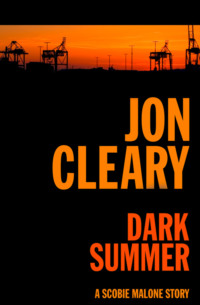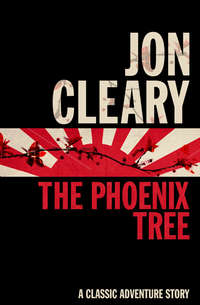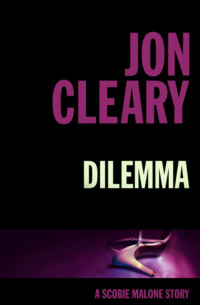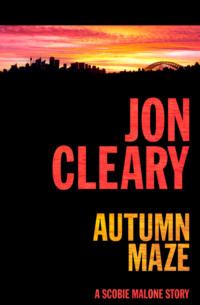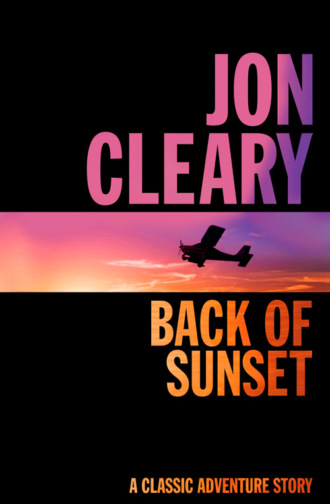
Полная версия
Back of Sunset
Goodyear pointed to the framed degree, hung on a side wall and almost obscured by the drawn-back curtains. “There.”
“What’s the matter, you ashamed of it or something? Or ain’t it as decorative as them two paintings?” Tristram had unwittingly hit on the truth, the reason why Rona had hung it where it was, but he hadn’t stopped talking to note the effect of his comment. “Well, I’m glad you’re still a doc, even if you do hide your proof of it. That’s why I’m here, Charlie. I been feeling crook lately. Well, not exactly crook, just a bit off, you know what I mean? About six months ago a horse fell on me, up Noonkanbah way, and busted a coupla ribs. It’s been sorta coming back on me lately.”
Goodyear looked at his watch. “I’m due out at St. Vincent’s at twelve for a lecture. But come on, Jack. You’re not going to any other doctor in Sydney while I’m still in practice.”
“That’s why I come to you,” said Tristram, winking at Stephen. “Why should I pay good money to a stranger when you owe me about ten quids’ worth of treatment? You never did pay me back that ten quid you borrowed on your wedding day.”
“You’ll leave here with a cheque, plus interest,” Goodyear said. “What a memory!”
“Me memory is all I’ve had sometimes,” said Tristram, and drew his shirt over his head: the crackling voice was all at once hushed, the clicking teeth silent. “It’s been a long time, Charlie, and I been gone a long ways. Memory is a good thing, Charlie, you know what I mean? And not for just remembering ten quids you’re owed.”
Tristram lay on the table against one wall and Goodyear began to examine him. Stephan stood by, listening to the continuous crackle of Tristram’s voice, his mind stumbling through the misty memories that were now coming back to him: a younger, dark-haired Tristram seen from the larger-than-life viewpoint of a twelve-year-old boy; his own father greeting Tristram with the same excitement as Goodyear had just shown; Tristram, talking a multi-coloured streak, his teeth clicking even then, telling him stories of the Outback that had made his boy’s heart leap till he was dizzy.
“Shut up, Jack,” said Goodyear. “I’m trying to hear what’s going on inside you.”
“Nobody ever hears what’s going on inside a man,” said Tristram, and winked again at Stephen. “You know what I mean?”
“A bush philosopher,” said Goodyear. “Shut up!”
Twenty years, thought Stephen, and the world and himself had changed for ever: he saw the world now through the wrong end of a telescope and his heart no longer leapt. But Tristram hadn’t changed, except in the flesh, where none of us could avoid it. His hair was grey now and thinned by years of sweat and neglect; the square, broken-nosed face was gullied with deep lines, and the eyes had faded, washed in too much sun; and the body now exposed on the white-sheeted table had begun to loosen round the belly and the legs and arms had begun to thin, the muscles atrophying and the flesh slackening off. But the energy and spirit were still there, and the voice was tireless.
“See that? A croc took a bit outa me up on the Roper. Had a good year that year, ‘48 it was, shooting crocs. Me and me mate ud do a hundred and fifty, two hundred crocs in a season. That? Got that breaking in some brumbies up on Gogo. That? Got that—”
He talked on and on without pride in his scars or wonder at the life he had led, lying there on the table in the elegant room in the building high above the roaring city while Goodyear probed and listened and grew increasingly sober. “Shut up for a while, Jack,” Goodyear said at last. “Get dressed.”
Tristram began to dress, struggling with the starched old-fashioned collar he wore. “Are you always as cranky as this during consultations? Wonder anyone comes to you.”
“Jack.” Goodyear was sitting at his desk, drumming a gold pencil on the pad before him. He had taken off his jacket and his tie was now loose; it suddenly struck Stephen, seeing the two older men in their shirt-sleeves, that there was almost a likeness between the two of them. It wasn’t so much a physical likeness, and yet whatever it was he knew that he himself didn’t share it. And taking off his jacket would bring him no closer to them. They shared something that seemed to have gone out of the world he knew, and he wasn’t sure what it was.
“Jack, I want you to go into hospital.”
“Hospital?” Tristram stopped struggling with the collar. “Ah, don’t be silly, Charlie—”
“Jack.” Goodyear looked at him with affection. “You’ve got a heart murmur that I don’t like. I think you were fortunate you chose me to come to – or did you remember I was a heart specialist?”
“I remembered all right, Charlie; But I come to you – well, you know why.” Tristram made a small gesture with a rough hand: it took in a friendship that had lasted years of separation. “There’s nothing wrong with me heart, Charlie.”
“You always were an argumentative coot.” Goodyear was talking now in the language of his youth; he had dropped even the hard-acquired smoothness from his voice. “I tell you, you’ve got a bad heart and I want you in hospital for a couple of weeks so I can have a good look at you. And I don’t want any flaming argument.”
“It’s outa the question,” Tristram said emphatically, his teeth clicking sharply. “I’m leaving Monday night by Quantas to go back home.”
“Where’s home?” Goodyear said.
Tristram waved a vague hand. “Well, not exactly home. I ain’t had a home for years if it comes to that, not since I went bush. But I keep going back to Winnemincka, and that’s where I’m going this time. Me mate’s waiting there for me. We got a job coming up, managing a station during the Wet while the bloke comes south on leave.”
“As your doctor—”
“You ain’t my doctor, Charlie,” Tristram said, with a kindly grin, and looked about the room again. “I could never afford anyone like you.”
“You’ll never owe me anything,” Goodyear said. “I’m the one who’s in debt, Jack.”
Stephen stood on the outskirts of the conversation, feeling like a trespasser in the world of the past that bound these two men. His own father had belonged to that world, and he had talked to Stephen of it with the regret of a man who had seen the sun of his life pass the yard-arm. Tom McCabe had been a dreamer, and Stephen recognised now that there were still traces of a dream left in these two men as they talked.
“Why did you come all the way south to see me, Jack, if you’re not going to take any notice of me?”
“I come south mainly to tidy up the family’s estate. Me two sisters are dead, and I’m all that’s left. There ain’t much, but I can take a few quid back north with me – I know some people up there could use it. No, I come to see you, Charlie, partly because of this pain I’ve had, but I dunno—” He looked about the room again, at Stephen, and then back at Goodyear: the crackling voice was slow now: “I come to see you because of old times, Charlie. When I left here back in 1921, when they said I had T.B. and gimme twelve months to live, I said good-bye then, remember? I come back for your wedding, when was that, ‘28, and then again in ‘38, it was the sesquicentenary celebrations that year. I was still alive, and I bought meself a new suit, can’t remember what I was celebrating, being still alive or a hundred and fifty years of Sydney. This is it, the same one. Cost me twenty quid, I remember saying to the bloke price was no object.” He looked at Stephen. “That was when I met you, Steve. And the last time I saw your dad. I said good-bye to him then, and that was the end of that. He was dead two years before I knew about it. Read it in an old Herald I picked up one day in a pub in Derby. It was lining one of the drawers in the wardrobe in me room.” He was silent for a moment, contemplating the devious ways news went round the world: bad news could never be hidden, not even in a drawer in a fly-blown room in a ramshackle hotel in Derby, two thousand miles from where the story had been written. He blinked, all at once old, and looked back at Goodyear. “I come to say good-bye, Charlie. For the last time.”
“I never say good-bye to my patients,” said Goodyear. “Or my friends. It’s bad psychology for a doctor.”
Tristram grinned, shaking his head. “Well, we’ll think of another word for it, Charlie. But I’m catching that plane Monday night. Me mate is waiting for me.”
“Write him a letter.”
“He can’t read,” said Tristram, grinning. “No, Charlie, I’m grateful for your diagnosis, but hospital’s out. When I hand in me chips, I don’t want it to be down here.” He looked out of the windows, at one of the most beautiful views in the world. “I know a better place.”
Goodyear attempted to argue, but to no avail: Tristram was a man you would have to knock unconscious before he would concede defeat. At last Goodyear rose, straightening his tie and pulling on his jacket. “I’ve got to go. Look, the family is going down to our place at Palm Beach for the week-end. Stephen is coming. You come, too.” He held up a hand. “No, don’t start another argument. You’re coming. Tell Stephen where you’re staying and he’ll pick you up.” He began to usher Tristram towards the door. “You’ll be interested in our house at Palm Beach. More glass than brick. The possums sit on the outside and we sit on the inside and stare at each other with equal curiosity. It’s called outdoor-indoor living or something. Peggy found the architect. Didn’t look the type that could ever look a possum in the face, but that’s what he prescribed for us. Do you ever regret having to give up architecture?”
“Never a regret, Charlie.”
“I’ve often wondered about you. Where you were, what you were doing—”
“Been all over the north and north-west. Never stopped any particular place, never designed even an outhouse, never built even a humpy. Anywhere back of sunset was good enough, anywhere where there weren’t too many people.”
“You’ve got something against people?” Goodyear said, smiling.
“Some of ‘em. City people, mostly. No offence.”
“And you don’t feel you’ve wasted your life?” Goodyear said, still smiling. “You had talent, Jack. You don’t feel you wasted it?”
Tristram looked about him. “I could ask you the same question, Charlie. I dunno you could give any better answer than I could.” He turned to Stephen and put out his hand. “I’m at the Metropole, Steve. Pick me up any time you like. It’s been nice seeing you again, son.”
“It’s been nice seeing you,” said Stephen, and looked at Goodyear standing in the open doorway, the web of the past, of dreams gone for ever, thick on his unsmiling face.
III
Stephen picked up Tristram just after six on that Friday evening and joined the streams of traffic fighting to get into the channels that would take them across the Harbour Bridge. “Lotta bad-tempered bastards,” said Tristram. “Where they all rushing to?”
“Some going home, some going away from the week-end,” Stephen said, keeping the Jaguar steady, out-bluffing a Holden trying to crash in from the left. “Friday night’s always a bit of a mad panic. Everyone likes to get home for a restful week-end.”
“Stone the bloody crows,” said Tristram, and stared out at the city as it battled furiously to get home for a restful weekend.
They were going down the Wakehurst Parkway, through the cool grey dusk of the forest, away from the city and the bad tempers, before Stephen said, “I went home and dug out an old trunk I haven’t looked at in years. I found this.”
Tristram took the small aboriginal charm. It was a rough carving of a bird, hung on a thin strip of kangaroo hide which passed through the closed beak of the bird. The charm had once been painted, but the red and yellow ochre now remained only in cracks in the wooden bird. It looked shabby and useless, a relic of childhood belonging with the broken top and the bent and rusted Meccano part. It’s magic had washed off with its paint.
“I remember it,” Tristram said. “Did it ever bring you any luck?”
“I don’t know,” said Stephen, surprised that another man could believe in portents: did Tristram mark the trail of his day by the first small happenings as soon as he woke? “Do you believe in that sort of thing?”
“I dunno that I got any beliefs at all. I just accept what comes. When it comes to things like these,” he bounced the charm in his hand, “the blacks are no sillier than a lotta whites.”
“Did you give it to me, hoping it would bring me luck?”
“I can’t remember, Steve. But I reckon I must have. Your old man never had much luck. Maybe I was wishing better things for you.” He looked out of the car, at the trees retreating into the dusk, closing ranks against the night. “It shook me when I read he was dead. I went out and got drunk, stayed that way for a week. Your dad was a great man, Steve, and nobody ever knew it. Only me, and maybe Charlie Goodyear.”
Stephen himself had never known it; no man could ever truly judge his father. “He was meant to be more than just a suburban G.P., if that’s what you mean. Though I don’t think he would ever have been as good a surgeon as Charles.”
“There’s more to being a doc than cutting people open. And I don’t mean being a physician, you know what I mean? Hippocrates could have had your old man in mind when he wrote his Precepts.” Education and learning still rode smoothly on the roughened tongue; the voice was the careless one of years in the Outback, but the mind remembered the books of its youth. “Me and Charlie and your old man, we were all idealists once. Your old man used to take pride in the fact that he was born in the same year as the Commonwealth. We were all gunna help build it, we used to say. Him and Charlie building its health, me building its buildings. Stone the crows, we dreamed, Steve. Talked and dreamed and hoped. And then I got T.B., and something happened to the other two. I remember thinking back in ‘38, the last time I saw Tom, he was the only one who still had his ideals. Charlie had forgotten his, and I didn’t need mine any more.” He looked at Stephen, his face chipped and worn as a rock in the pale light from the dashboard. “Your old man should never have given up that Flying Doctor job, Steve.”
“He had to give it up. My mother couldn’t take it up there in the Kimberleys. It’s not woman’s country. We stayed only six months and she hated every day of it. She tried, Jack, I know that. But she just couldn’t take it.”
“Did you like it?”
“I can’t remember much of it. I was only seven then. It was the Wet season and I never got out of Winnemincka.”
“It hasn’t changed since you were there. Maybe got even a bit worse – the pearlers have all gone.” He looked sideways at Stephen, a little slyly. “You oughta come up some time for a holiday.”
Stephen shook his head, smiling at the old man’s naïve approach. “I’m off to England early next year. I’ve been going to go for five years, to do my F.R.C.S.”
“You a good doc, Steve?”
“I’m supposed to be. That’s why Charles chose me as his partner. I don’t think he took me in just because he knew Dad.”
“You gunna take over from him when you come back?”
“That was the idea originally.” Stephen changed gears carefully, turning the car into the main road from the parkway, keeping his eyes on the road as if he were still besieged by the battling traffic they had now left far behind. “I don’t know that I’m coming back.”
“Why not?” Tristram’s crackle had an edge to it. “Too many bloody people leave this country and never come back.”
“I’ve got other plans. Or rather, Charles’s daughter has. We’re sort of semi-engaged.”
“And she’s making the plans for you? Stone the crows, what’s happening to the bloody men of this country? Charlie’s wife running him, his daughter running you – and if it comes to that, your mum ran your dad’s life.”
Stephen felt a surge of anger. “You’re one-eyed about that. My mother tried – don’t you think Dad owed her something?”
“I’m shoving me neck out, not minding me own business.” Tristram’s teeth clicked savagely: the words were awkward in his mouth, too long held back. “Your old man was meant for more than being a good husband, being a father to you, looking after a lotta patients who never appreciated him. He was wasted, son. Christ, I never seen a man whose life was so wasted!”
“How do you know he was wasted?” said Stephen, defending his dead mother but knowing she would never have defended herself: she had loved his father and had tried, really tried, to live where Tom McCabe’s heart had driven him: but her body and her will had been weak, and Tom, loving her as much as she loved him, had given in. “How do you know he was wasted?”
“He knew it himself, son. When I said good-bye to him back in ‘38,I knew which one of us was already the dead one.” He handed back the aboriginal charm. “Here you are, Steve. You may need this yet.”
Конец ознакомительного фрагмента.
Текст предоставлен ООО «ЛитРес».
Прочитайте эту книгу целиком, купив полную легальную версию на ЛитРес.
Безопасно оплатить книгу можно банковской картой Visa, MasterCard, Maestro, со счета мобильного телефона, с платежного терминала, в салоне МТС или Связной, через PayPal, WebMoney, Яндекс.Деньги, QIWI Кошелек, бонусными картами или другим удобным Вам способом.



